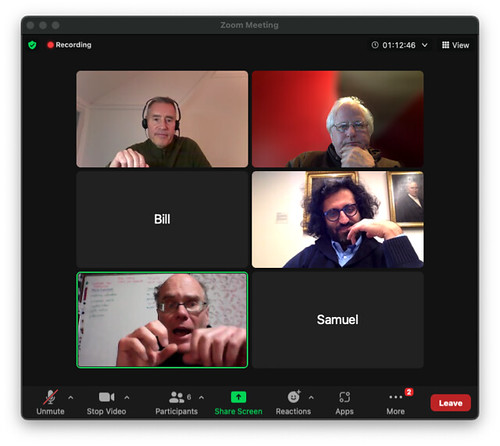Trucking, as a profession, is inherently an attractor of polymaths. The driving part is already multi-disciplinary, but then there's the data science, the people skills, the opportunities to encounter other cultures when driving long haul (or even over short distances). I've been developing a science fiction narrative in which truckers become citizen diplomats.
Aslam at Princeton is joining us thirty minutes after the announced start time owing to room scheduling issues. Now that he's here, we'll switch to another channel where he'll present about Michael Polyani's The Study of Man.
Although we're not all mathematicians in some technical sense (all of us share in interest an math), the cognitive framework being developed by Andrius is an anchoring one. Fortunately (for me at least), Andrius is using his framework in a mindful way that encounters other systems and disciplines as more grist for the mill.
In my opening remarks, before Aslam arrived, I talked briefly about Bob Textor of Thirsters and his importance in getting anthropology inserted into Peace Corps work, both in training of personnel and in their field discipline. I also write about a Chinese Peace Corps in these journals, as any civilization is likely to encounter this idea, perhaps to absorb some Americana.
Polyani's framework contrasts explicit and tacit knowledge. The former is assumed to be true by its holder (lets say we "contain" knowledge), whereas tacit knowledge tends to be unarticulated and therefore harder to disprove. Tacit knowledge is less likely challenged, because it's harder to see.
I'm reminded of Arnold Mindell's Consensus Reality (CR) versus Nonconsensus Reality (NCR), in that one may be unconscious of how one's biases are unshared (in the sense of unchecked).
Also during my check in, I talked about an archetypal vision of M4W as a gathering of heroes, like the Jedi Knights, who might be dispatched to trouble zones, with powers to help the affected peoples restore harmony. That's a comic book picture more than a present reality -- more science fiction in other words.
Think of a plot line in which ETs broker a piece between tribes A and B, because the ETs are able to bring tacit knowledge to the surface in both tribes, to where a sufficient consensus reality might be forged.
Prearticulated nonconsensual attitudes and biases, not to mention missing knowledge (not shared on both sides) have a way of undoing attempts to "get along". The ETs catalyze a growing area of explicit overlap.
That all sounds fine and good for science fiction, but we don't have ETs (there's no consensus that we do), let alone those with the patience to play intermediary. But might we cultivate an ET point of view (ETPV, ET PoV)? Enter M4W and its alien viewpoints.
Popper also enters my thinking here: we talk about beliefs being believable to the extent they're falsifiable, but then we also have what we call truisms, where the opposite is more nonsensical than incorrect.
Wittgenstein's On Certainty explores this difference: between what's believable, and therefore adjustable, and what's unquestionable (raw phenomena? tautologies? certainties?). Let's talk about grammars, forms of life.
I'm currently in a meetup about The study of man : Polanyi, Michael, 1891-1976 : Free Download, Borrow, and Streaming : Internet Archive https://t.co/uTZw3jFhuT via @internetarchive
— Kirby Urner (@thekirbster) November 9, 2023

